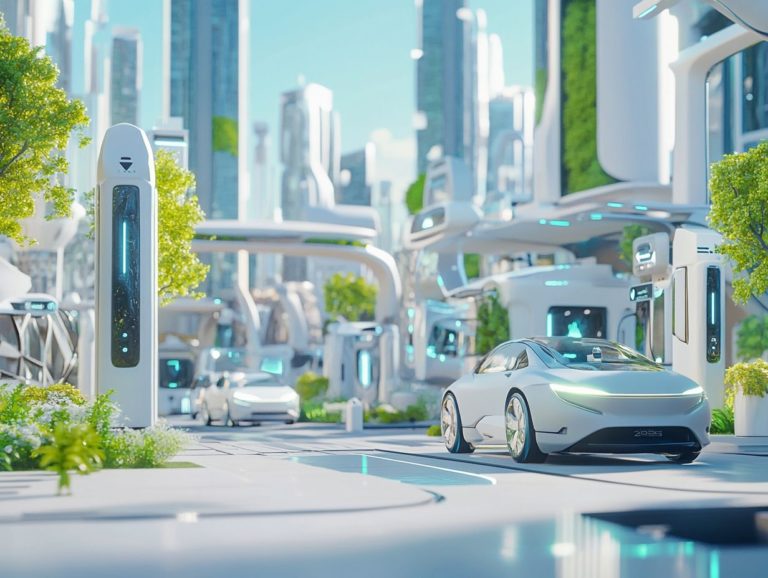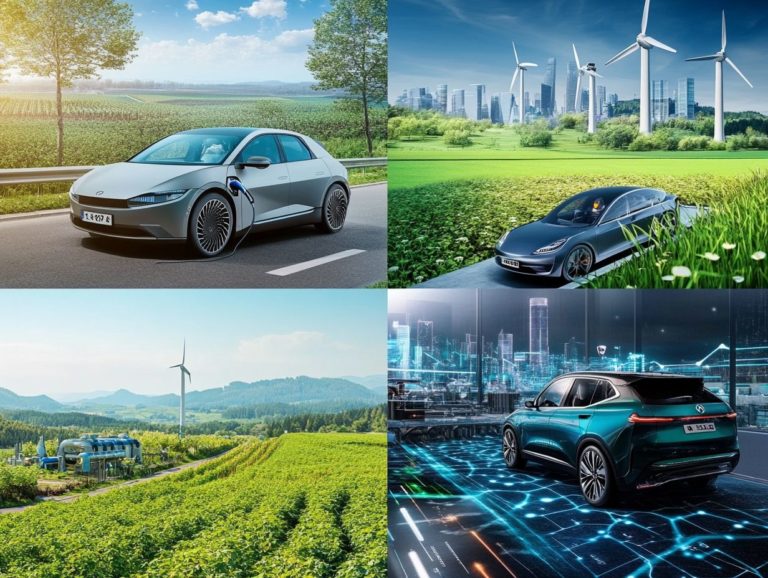electric vehicle innovations in battery technology
Electric vehicles are transforming rapidly. Battery technology is at the heart of this change.
Recent innovations are redefining your understanding of energy storage. New materials elevate performance, and pioneering charging solutions promise better efficiency and aim to reduce environmental impact.
However, challenges persist. Let s explore the latest trends in battery technology, highlighting the benefits they offer and what the future may hold for electric vehicle batteries.
Uncover the driving force behind the forthcoming wave of automotive innovation!
Contents
- Key Takeaways:
- Overview of Battery Types
- Recent Innovations in Battery Technology
- Benefits of New Battery Technology
- Challenges and Limitations
- Future of Electric Vehicle Battery Technology
- Frequently Asked Questions
- What are some recent electric vehicle innovations in battery technology?
- What are solid-state batteries?
- How do nickel and cobalt play a role in electric vehicle battery technology?
- What is vehicle-to-grid technology?
- What are some challenges facing electric vehicle battery technology?
- What does the future hold for electric vehicle battery technology?
Key Takeaways:
Here are the key insights to remember about battery technology:
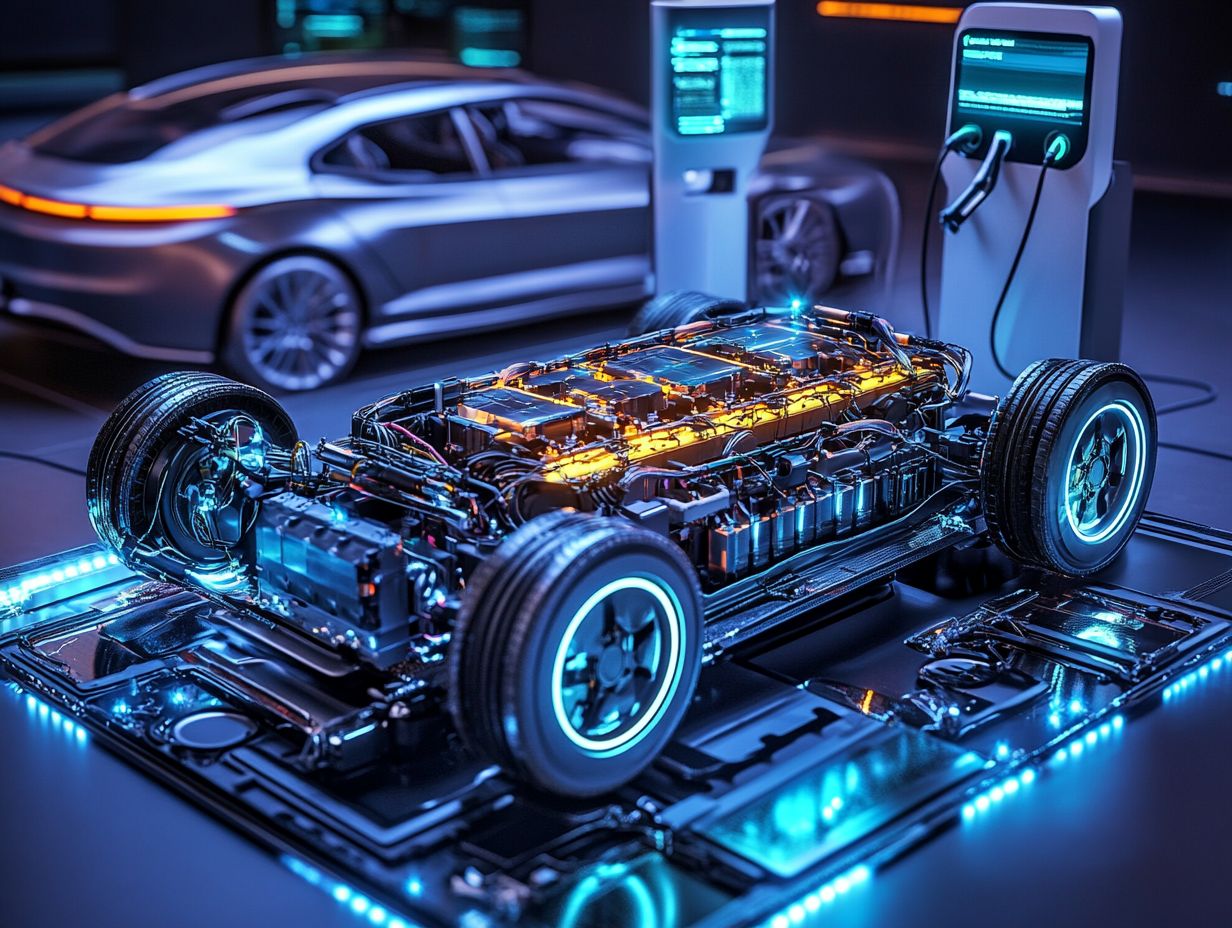
Advancements in battery materials have led to improved performance and efficiency in electric vehicles, making them a more viable and attractive option for consumers.
New charging technologies, such as fast charging and wireless charging, are making it easier and more convenient to power up electric vehicles, addressing a major concern for many potential buyers.
The continuous innovation and development of battery technology for electric vehicles, including research on electric vehicle battery life improvements, are leading to a more sustainable future, reducing our dependence on fossil fuels and decreasing our environmental impact.
Overview of Battery Types
In the fast-paced world of electric vehicles (EVs), grasping the different battery types is essential for both consumers and manufacturers.
The key battery technologies lithium-ion, solid-state, and sodium-ion each present their own set of advantages and challenges. These batteries don t just fuel cutting-edge electric mobility solutions; they also play an important role in shaping the broader EV battery industry.
Their impact extends to critical factors such as energy density (the amount of energy a battery can store in a given space), driving range, charging time, and overall battery costs, making it vital for you to stay informed in this dynamic landscape.
Recent Innovations in Battery Technology
The electric vehicle market has seen remarkable strides in battery technology, crucial for elevating performance and efficiency.
These innovations in the EV battery sector have led to enhanced energy density, minimized charging times, and even the advent of electric vehicle news technologies.
This means electric vehicles can now play a vital role in bolstering grid resiliency, offering seamless integration into the energy landscape.
Advancements in Battery Materials
Advancements in battery materials have been transformative for the EV battery industry, highlighting the importance of sourcing materials that boost energy density while keeping costs down.
Innovations in battery chemistries, such as Lithium Iron Phosphate and Nickel Manganese Cobalt, have emerged as true game changers, enhancing performance without compromising sustainability.
These materials not only extend the lifespan and efficiency of batteries but also significantly lower production costs.
Recent studies, like those by McKinsey & Company, reveal a growing trend toward adopting more sustainable raw materials, addressing the environmental concerns linked to battery manufacturing.
This shift includes a focus on recycling methods and the utilization of plentiful, less toxic elements.
As the demand for electric vehicles continues to rise, these advancements in battery materials are crucial for crafting efficient, cost-effective, and eco-friendly energy solutions that will shape the future.
New Charging Technologies
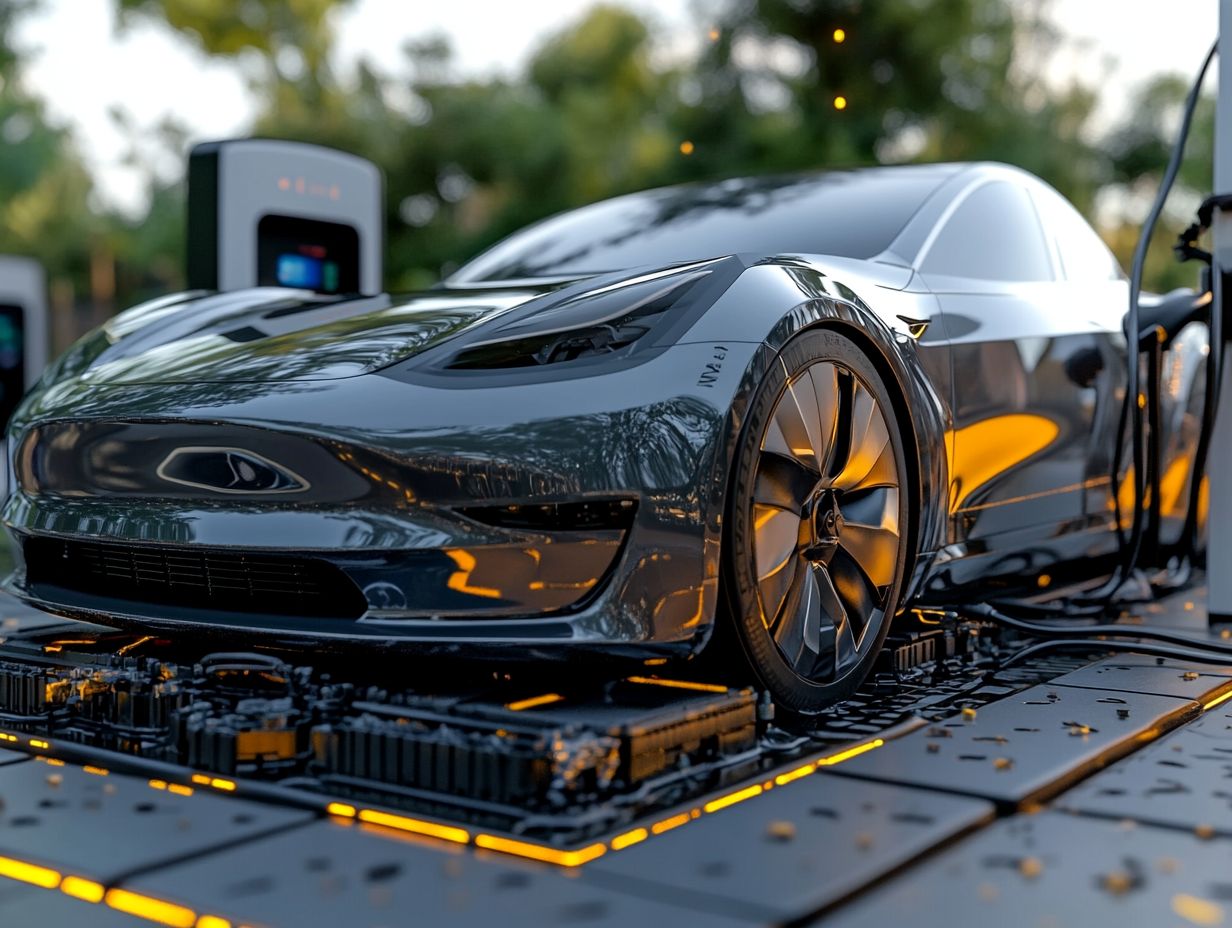
The evolution of new charging technologies is essential for enhancing your electric mobility experience, significantly influencing charging times and overall performance improvements.
Innovations like fast-charging stations and wireless charging systems are redefining convenience for you, the electric vehicle user, ultimately making EVs more accessible to everyone.
Advancements such as ultra-fast chargers now deliver ample power in mere minutes, addressing one of your main concerns: range anxiety.
Meanwhile, wireless charging technology offers seamless energy transfer without the frustration of plugging in, significantly enhancing your user experience.
Be aware of the potential drawbacks, but don t let them overshadow the benefits! The continuous improvements not only enhance the usability of electric vehicles but also play a crucial role in their broader adoption, shifting public perception and paving the way for sustainable transportation solutions.
Benefits of New Battery Technology
New battery technology provides many advantages that improve the performance and sustainability of electric vehicles, making it essential to stay informed about electric vehicle trends to watch in the next decade.
These innovations translate into enhanced power capacity, increased driving range, and faster charging times, promoting a more eco-conscious approach to electric mobility.
Improved Performance and Efficiency
Improved performance and efficiency are key benefits of new battery technology. These advancements enhance your driving experience in electric vehicles.
With advancements in power capacity, vehicles like the much-anticipated Tesla Model 2 are poised to offer greater driving ranges. More affordable options like Lithium Iron Phosphate batteries are also becoming available.
Take Ford, for example, which is set to unveil the F-150 Lightning. This model promises significant improvements in range and charging speed, thanks to cutting-edge battery solutions.
As battery technology continues to evolve, you’ll see even more electric models emerging, boasting unprecedented range capabilities potentially exceeding 500 miles on a single charge.
Such advancements could transform consumer perception and encourage broader adoption of electric vehicles, paving the way for a more sustainable automotive landscape.
Reduced Environmental Impact
One of the most compelling advantages of new battery technologies is their remarkable potential to reduce environmental impact, aligning seamlessly with global sustainability goals.
Innovations in battery chemistry and production methods are enhancing grid resiliency while minimizing carbon footprints in the electric vehicle sector. By opting for more sustainable materials, such as recycled metals and organic components, these advancements improve battery performance and diminish the ecological footprint linked to raw material extraction.
Manufacturers are adopting zero-waste practices and cleaner production techniques, guided by stricter regulations to promote eco-friendliness. Integrating renewable energy sources into battery manufacturing significantly reduces greenhouse gas emissions.
These practices cultivate a circular economy within the battery industry, paving the way for a more sustainable and greener future.
Challenges and Limitations
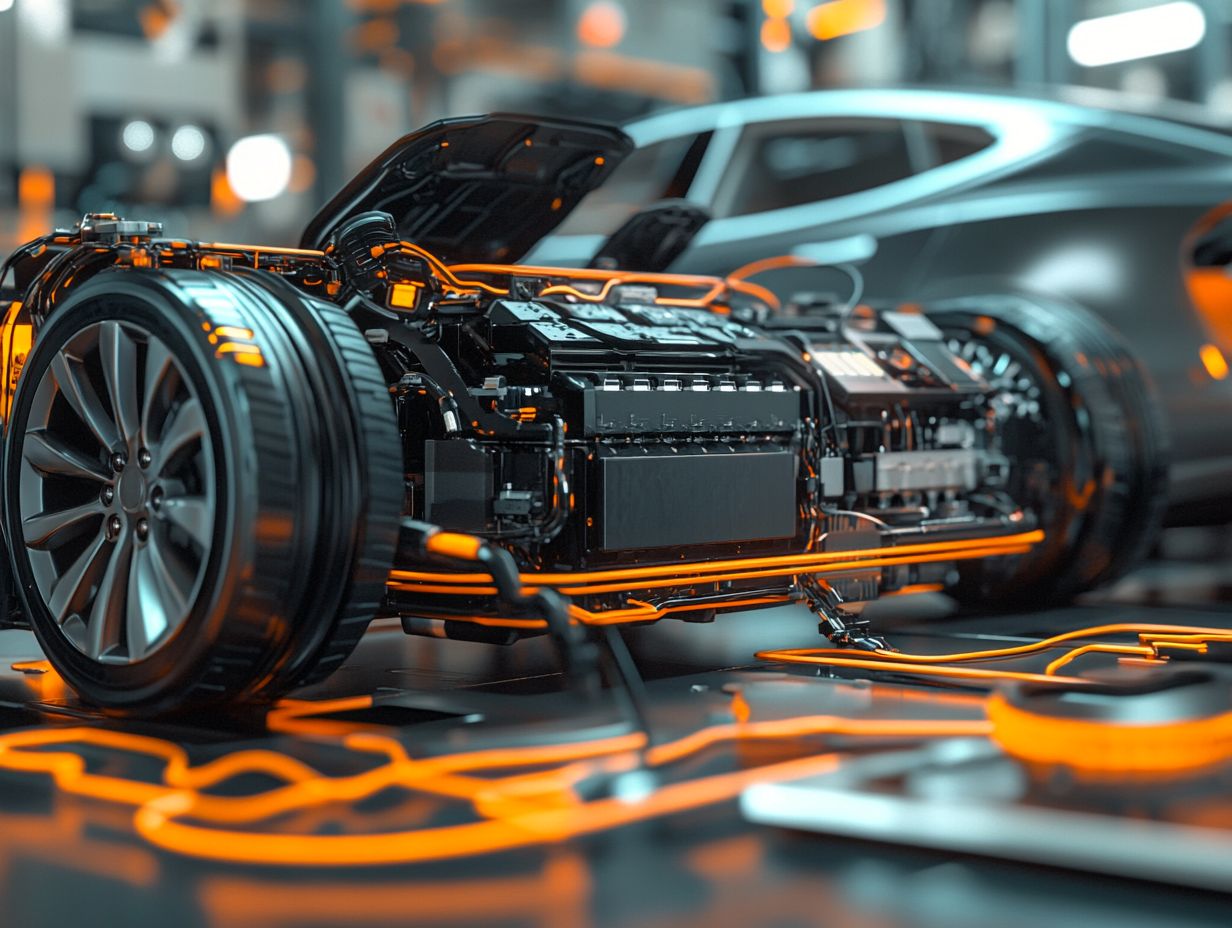
While the evolution of battery technology is undeniably exciting, several challenges and limitations still loom over the electric vehicle industry.
High battery costs, gaps in charging infrastructure, and the need for more efficient battery chemistries present significant hurdles that manufacturers must address to propel the industry forward.
Current Limitations and Potential Solutions
Current limitations in battery manufacturing, such as high costs and scalability issues, present significant hurdles to the widespread adoption of electric vehicles. However, promising solutions are on the horizon.
Advancements in production techniques and alternative battery chemistries are being explored to tackle these challenges. Research into solid-state batteries is particularly promising as it uses safer materials while offering higher power capacity.
Industry collaborations are paving the way for new partnerships that facilitate knowledge and resource sharing. Some companies are investigating lithium-sulfur batteries, which could lead to lighter and more efficient energy storage options.
By streamlining supply chains and investing in sustainable materials, the industry is diligently addressing these critical issues to support a green energy future.
Future of Electric Vehicle Battery Technology
Get ready! The future of electric vehicle battery technology is exciting and full of potential.
Numerous predictions suggest that more efficient and sustainable solutions are on the horizon.
Innovations in battery chemistries, such as solid-state and sodium-ion batteries, are set to redefine the EV battery industry, ultimately enhancing your experience with electric mobility.
Predictions and Expectations
Battery technology is set to revolutionize our future! You can expect significant advancements in both performance and sustainability, particularly from innovators like Rivian and Tesla.
Legislative measures, such as the Inflation Reduction Act, will drive innovations and accelerate the transition to electric mobility.
These exciting developments are likely to enhance energy density and reduce charging times, making electric vehicles (EVs) more accessible and affordable for a wider audience.
Economic factors, including supply chain improvements and the plummeting costs of raw materials, will further shape this landscape. As you learn more about environmental issues, you’ll seek greener alternatives, encouraging companies to invest in cutting-edge battery solutions.
The combination of new technology and supportive policies will transform the market, pushing you and other consumers toward sustainable energy options.
Frequently Asked Questions
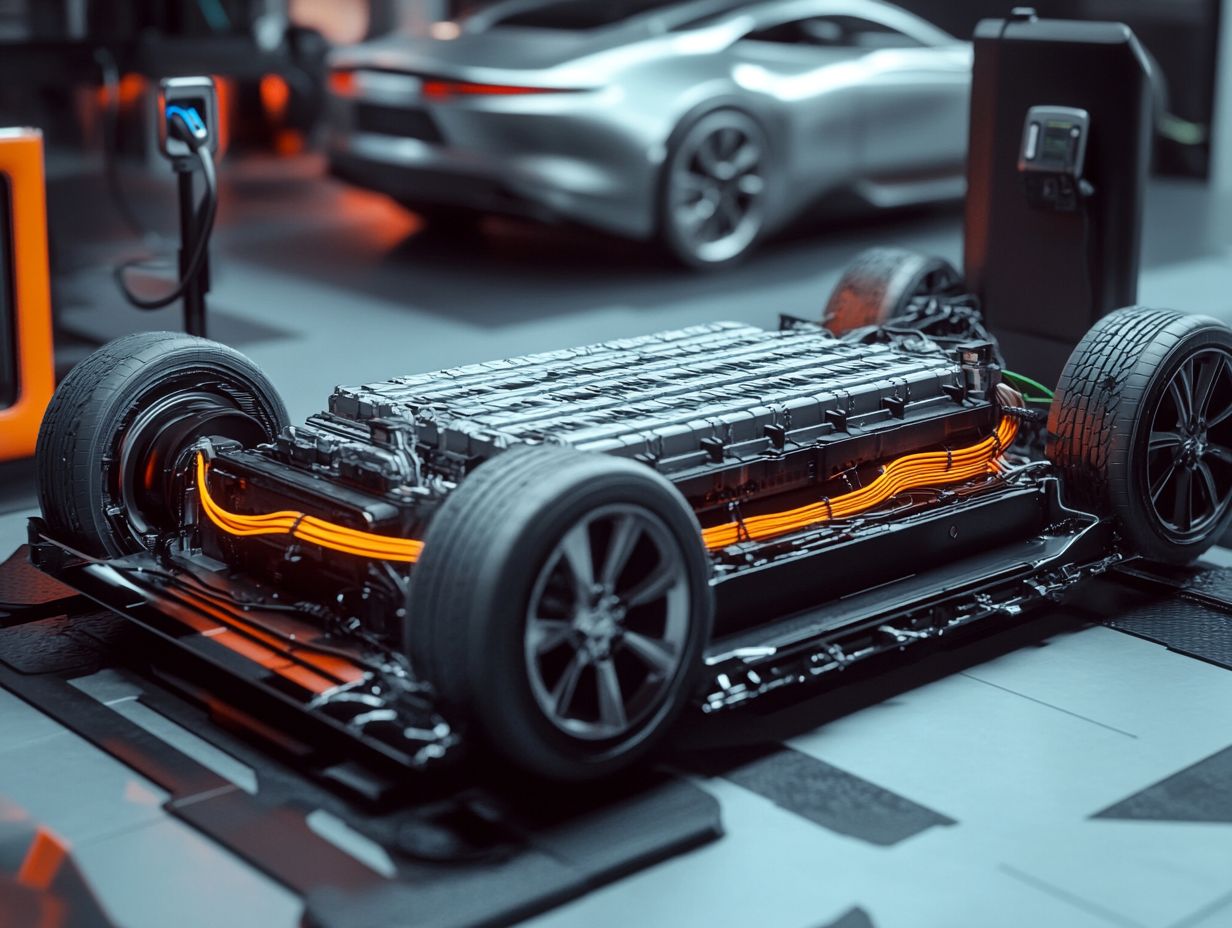
What are some recent electric vehicle innovations in battery technology?
Recent innovations in electric vehicle battery technology include the development of solid-state batteries, which use solid materials instead of liquids, increased use of nickel and cobalt in lithium-ion batteries, and the introduction of vehicle-to-grid technology, highlighting the latest trends in electric vehicle technology.
What are solid-state batteries?
Solid-state batteries, using solid materials instead of liquids, are safer and more efficient than traditional lithium-ion batteries. They are still in early development but have the potential to significantly improve electric vehicle performance and range.
How do nickel and cobalt play a role in electric vehicle battery technology?
Nickel and cobalt are essential components in lithium-ion batteries, the most commonly used batteries in electric vehicles. They help increase energy density and improve performance, but their mining and production can have negative environmental and social impacts.
What is vehicle-to-grid technology?
Vehicle-to-grid technology allows electric vehicles to transfer energy back to the grid when not in use. This provides a potential source of clean energy and balances fluctuations in energy demand. It could also reduce the need for new power plants and improve grid stability.
What are some challenges facing electric vehicle battery technology?
Some main challenges include high costs, limited range, and the environmental impacts of battery production and disposal. There is also a need for more efficient and sustainable sourcing of raw materials.
What does the future hold for electric vehicle battery technology?
The future of electric vehicle battery technology looks promising, with ongoing research focused on enhancing performance, reducing costs, and addressing environmental concerns. The shift towards renewable energy sources and widespread vehicle-to-grid technology could significantly impact the industry.
Want to know more about electric vehicles or battery technology? Stay informed and explore the advancements shaping our sustainable future!

